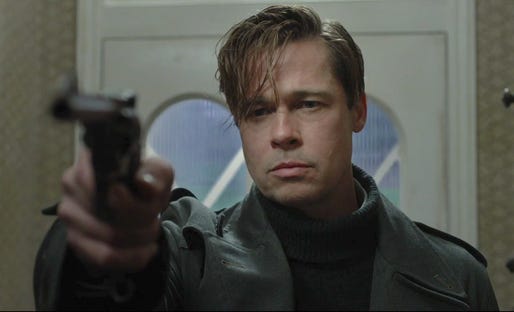Allied

Given a prelude of Brad Pitt parachuting (as if from heaven) onto picturesque Moroccan dunes, you’re primed to expect little from “Allied” beyond a lavish World War II lark with pretty people on exquisite sets and enthralling locations. (After “Inglourious Basterds” and “Fury,” why wouldn’t Pitt want to lighten up his WWII trifecta?)
Pitt’s character lands in the sand with all the impact of a nose booping, as does co-star Marion Cotillard’s exclamation to him that this is just how people behave in Casablanca. “Allied” often feels unhurried, unchallenging and uncomplicated in its early going.
But then you wonder where the jokes went, when the lively cat-and-mouse chases will begin and … oh, wait, did Pitt and Cotillard’s gunfire split that lady’s head open? Eventually, “Allied” reveals itself as the most atypically Zemeckis film Robert Zemeckis has yet directed — sacrificing his reliable brand of burnished gentleness and wowing spectacle for something gruff, grim and, as needed, gory. Yes, the excellent “Flight” was a mostly low-key story of addiction but dat plane crash tho.
This is not to say Zemeckis has gone all-in gritty or abandoned striking, symbolic visuals; a miraculous birth amid a blitzkrieg and a sex scene in a sandstorm are lovely to behold. (Pay less attention to the zeroes-and-ones added in to subtract years from Pitt’s face early on; he’s better off embracing the Redfordian ruggedness that has long been his destiny than looking like he could conduct the Polar Express.)
But these bits stray far from Zemeckis’s usual envelope-pushing, blockbuster-bauble setpieces — memorable far more for the powerful human connections they represent, which Steven Knight’s deceptively dark script forcefully tears asunder.
Canadian intelligence officer Max Vatan (Pitt) and French Resistance fighter Marianne Beausejour (Cotillard) are first flung together in 1942 Morocco. Their mission? Pose as a Parisian husband and wife, gain access to a Nazi shindig and assassinate a high-ranking German ambassador. Survival is optional, its likelihood placed by Max at 40% in what seems like a generous calculation.
Charged by classic Thomas Crown-ish chemistry, Max and Marianne’s prep runs the spy-jinks playbook. He expertly tickles the ego of a Nazi functionary (August Diehl) to curry favor. She helps him with his Parisian-accented French (or lack thereof). She displays tactical skills he doesn’t expect while, at a sink-or-swim moment, he dispatches brute force she didn’t anticipate. She suggestively unbuttons her blouse — ostensibly to beat the heat but also to test him. “Fucking each other fucks each other,” Max says. Marianne’s counter: “The mistake is to feel.”
Once that sandstorm hits, both operatives’ operandi go out the window and we then see how their assassination mission plays out — briskly, bloodily and, best of all, with no recognizable character actors to tip the outcome’s hat. Knight's script further upends assumptions of on-the-run resolution by jumping forward — weeks, months, years.
Max and Marianne are now married and living on London’s outskirts. He chips in on secret missions with chaps from the British Royal Air Force at the Hendon Aerodrome and she has left all danger behind to raise their daughter. Theirs is a life of contentment, complacency and calm, the clothes of counterespionage collecting dust in a closet. All the more playfully with which to dangle dread before us.
Unexpectedly, there is an accusation that one of them is actually a German spy — still operational and leaking London intelligence. So begins a long weekend during which Max and Marianne share suspicious glances, baited traps, ideological doubt and, eventually, dangerous incursions behind enemy lines to ferret out the truth.
Having allowed us to luxuriate in movie-star pleasures expected of Pitt and Cotillard, Zemeckis lures them toward lesser-seen sides — domestic and paternal bliss, emotional instability, a sort of war with moral integrity. (One decision Max makes in particular illustrates he’s comfortable ringing up quite a tab with his all-costs approach.)
This chamber-piece intimacy matches the physically combustible attraction, and Zemeckis brings both to a believable boil; here, from the director of “Forrest Gump,” is a Verhoeven-lite film that includes enough personality-infused sex that fucking differently becomes a dangerous tell.
That “Allied” comes to feel even remotely so primal never betrays the confidence with which Knight and Zemeckis guide us through suspense and surprise. Although we suspect “Allied” must end in irreversible violence, we know not in what form until the exact moment.
Like his own “What Lies Beneath” without the laughable ending, here’s another Zemeckis genre programmer that digs deep into ideas of partner betrayal … with superior results.


